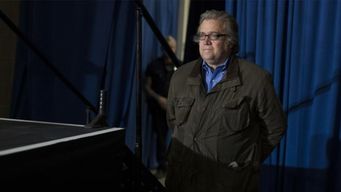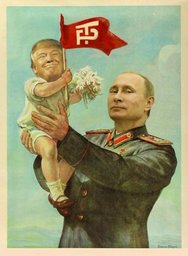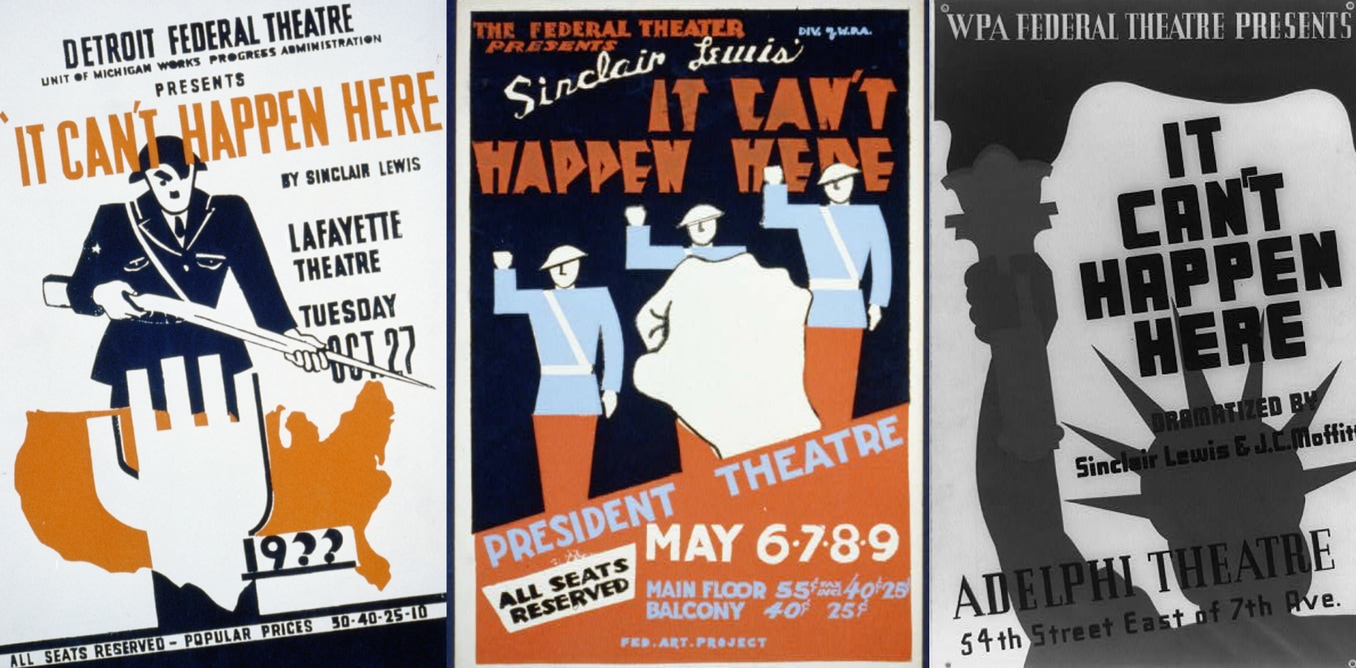"For the past three months, a great deal of the American population has been in shock. How could this happen? How could we get this so wrong? But the truth of the matter is, history and literature has been predicting the Trump presidency for centuries now. And as the American people, we’ve ignored the warning signs." - Chloe Xtina |
Growing up a child in the U.S, the nationalist sentiment is that America is Number 1, a land of freedom that once harbored oppression now cleared by the American Revolution and the Civil Rights Movement. As a child, everything horrible happened sometime else: slavery in the 1800s, the holocaust in the 1940s, and so on. It’s the sentiment: “It Can’t Happen Here”, a dangerous and all too familiar saying. But now with a man in the country’s ultimate power who demands applause and admiration, who orders the neglect and fear of a mass of people, who manipulates and disregards facts and intellectualism, it becomes more and more apparent that America is no longer “Number 1”. No longer “land of the free”. And by definition, no longer a full democracy. In fact, the current administration links more and more to the ideals of fascism. For the past three months, a great deal of the American population has been in shock. How could this happen? How could we get this so wrong? But the truth of the matter is, history and literature has been predicting the Trump presidency for centuries now. And as the American people, we’ve ignored the warning signs.
There are four dictators to come that come to mind for me when thinking about the Trump presidency. Keep in mind, I do not mean to say that Trump directly parallels these men but I do think it’s important to note that some of their policies or ways of speaking reflect the same strategies Trump has used throughout his presidential campaign and into his presidency. I’d like to break down Trump’s communication and power strategies into four categories for the purposes of this article: (1) the wish to obstruct and neglect of groups of people, (2) need for appreciation and attention, (3) insecure masculinity and sexism, and (4) scrutiny of artists and journalists.
There are four dictators to come that come to mind for me when thinking about the Trump presidency. Keep in mind, I do not mean to say that Trump directly parallels these men but I do think it’s important to note that some of their policies or ways of speaking reflect the same strategies Trump has used throughout his presidential campaign and into his presidency. I’d like to break down Trump’s communication and power strategies into four categories for the purposes of this article: (1) the wish to obstruct and neglect of groups of people, (2) need for appreciation and attention, (3) insecure masculinity and sexism, and (4) scrutiny of artists and journalists.

I.
It is no surprise that Trump represents and idealizes a system already in power: a born-wealthy cis straight white man with no empathy for groups or people other than himself. However, Trump takes this system a step forward: with the need to punish those who do not reflect himself. Recently, Trump’s targets have been the Muslim community, the Latino community, the transgender community, the poor inner-city African-American community, and even the Jewish community (which for many years was falsely assumed to be a protected class by such systems). The Muslim ban, rigor placed on deportation in the past weeks, refusal to acknowledge the recent hate crimes on the Jewish people, and reversal of transgender protection in schools all reminds me of a form of eugenics.
By definition, eugenics is “the science of improving a human population by controlled breeding to increase the occurrence of desirable heritable characteristics.” Eugenics is most often associated with euthanasia and the Nazi movement but in fact, eugenics has been occurring in many forms since the 1800s and by technical classification, up until the late 1990s. I would argue that eugenics has continued since the 1990s as a sort of invisible but deadly strategy to control the circulation of Americans. This has taken the form of strict deportation laws, the war on drugs focusing on the incrimination of black people, police brutality, and even more subtly, gentrification. But eugenics became ever more apparent when Trump launched his executive orders to suspend refugee admission and to reverse the transgender bathroom bill. (In fact, these executive orders to “suspend” are strikingly similar to Sinclair Lewis’ It Can’t Happen Here plotline on going above judicial and congressional review for a reserved class’s benefit.)
Although this statement is a very controversial line, the system of eugenics and displacement of people from the United States or a forced feeling of being unwelcome to minority communities by the administration draws parallels to the beginning of Hitler’s regime. That is not at all to say that Trump is a parallel of Hitler or of his ideals but it is to say that it’s important to recognize how some of Trump’s top priorities resembles a need to dismiss certain classes of people, ignore them, and bar them from the country. It is important to note that chief strategist Stephen Bannon appears to be the man behind all orders regarding the dismiss of the Muslim people. Recently, the Huffington Post reported that Stephen Bannon praises The Camp of Saints which they called “a stunningly racist French novel” in which Bannon “explains the world”. In this novel, a wave of impoverished immigrants takes over the Western world with a mission to wipe out white people. The novel targets these immigrants as threat to the white Christian world. Bannon is also highly praised by the alt-right, a Neo Nazi platform that has taken media by storm. Bannon has been openly anti-semitic, racist, has called for Christian holy war, and has found inspiration in Nazi propaganda. Bannon has said, “We are in an outright jihadists, Islam, (and) Islamic fascism.” With Bannon idealizing Nazi propaganda, he is feeding Trump his direct ideals through being his right hand man. Therefore, the president of the United States is, in fact, receiving advice and insight from a Nazi sympathizer and tolerant.
It is no surprise that Trump represents and idealizes a system already in power: a born-wealthy cis straight white man with no empathy for groups or people other than himself. However, Trump takes this system a step forward: with the need to punish those who do not reflect himself. Recently, Trump’s targets have been the Muslim community, the Latino community, the transgender community, the poor inner-city African-American community, and even the Jewish community (which for many years was falsely assumed to be a protected class by such systems). The Muslim ban, rigor placed on deportation in the past weeks, refusal to acknowledge the recent hate crimes on the Jewish people, and reversal of transgender protection in schools all reminds me of a form of eugenics.
By definition, eugenics is “the science of improving a human population by controlled breeding to increase the occurrence of desirable heritable characteristics.” Eugenics is most often associated with euthanasia and the Nazi movement but in fact, eugenics has been occurring in many forms since the 1800s and by technical classification, up until the late 1990s. I would argue that eugenics has continued since the 1990s as a sort of invisible but deadly strategy to control the circulation of Americans. This has taken the form of strict deportation laws, the war on drugs focusing on the incrimination of black people, police brutality, and even more subtly, gentrification. But eugenics became ever more apparent when Trump launched his executive orders to suspend refugee admission and to reverse the transgender bathroom bill. (In fact, these executive orders to “suspend” are strikingly similar to Sinclair Lewis’ It Can’t Happen Here plotline on going above judicial and congressional review for a reserved class’s benefit.)
Although this statement is a very controversial line, the system of eugenics and displacement of people from the United States or a forced feeling of being unwelcome to minority communities by the administration draws parallels to the beginning of Hitler’s regime. That is not at all to say that Trump is a parallel of Hitler or of his ideals but it is to say that it’s important to recognize how some of Trump’s top priorities resembles a need to dismiss certain classes of people, ignore them, and bar them from the country. It is important to note that chief strategist Stephen Bannon appears to be the man behind all orders regarding the dismiss of the Muslim people. Recently, the Huffington Post reported that Stephen Bannon praises The Camp of Saints which they called “a stunningly racist French novel” in which Bannon “explains the world”. In this novel, a wave of impoverished immigrants takes over the Western world with a mission to wipe out white people. The novel targets these immigrants as threat to the white Christian world. Bannon is also highly praised by the alt-right, a Neo Nazi platform that has taken media by storm. Bannon has been openly anti-semitic, racist, has called for Christian holy war, and has found inspiration in Nazi propaganda. Bannon has said, “We are in an outright jihadists, Islam, (and) Islamic fascism.” With Bannon idealizing Nazi propaganda, he is feeding Trump his direct ideals through being his right hand man. Therefore, the president of the United States is, in fact, receiving advice and insight from a Nazi sympathizer and tolerant.

II.
For years, the United States has condemned the actions and reign of North Korean government which had come to power with a fascist regime. Kim Jong-un currently serves as the “supreme leader” and is known for his cult of personality. Since stepping into power after his father’s death, Kim Jong Un has been condemned by the UN General Assembly for human rights violations and the US Department of the Treasury (under President Obama) has imposed personal sanctions against him. He, just as the dictators before him, have imposed harsh conditions on the North Korean people and has ruled the country like a cult leader might: creating uniformity, forced nationalism, and depriving the nation of needs such as sufficient food. North Korean media is known to be one of the most strictly controlled in the world. Kim Jong-un’s father, Kim Jong-il, frequently had the media report on himself in positive lights and forcing propaganda to delude citizens of how the outside world really saw North Korea. Kim Jong-un has continued this behavior into his regime, forcing the media to cover only positive interpretations of the government and forbidding access to foreign media.
A similarity between Trump’s administration and this regime must come forward. Since his inauguration, Trump has hired people to attend his press conferences and clap and boo, respectively, when he finds it important. His press secretary, Sean Spicer, and his former campaign manager turned advisor, Kellyanne Conway, have both used the excuse of “alternative facts”, meaning falsehoods, as a way to ignore questions they don’t want to answer or lie to the press. Trump has also used outlandish statements such as “I am the least racist/sexist/anti-semitic person you will ever meet.” when asked about the racism, sexism, or anti-semitism that has risen since his presidency. Trump also uses Twitter as a platform to complain about those who have scrutinized him by insulting the party who has caused him offense, by turning the blame onto someone else, or by simply for lack of a better term, whining. This need to be appreciated by media and the public displays insecurity among the Trump administration and a need to cover up. By manipulating the press and his own self-image, Trump is inherently lying to the public such as Kim Jong-un and his father demanded the media too. (Keep in mind, North Korea’s constitution provides for freedom of speech and press but the government has not been upholding these standards.)
III.
In his insecurity, Trump finds a fixation on his hands. In this need to compensate for his hands and his body shame, Trump repeatedly shames the bodies of women and ignites a sense of hyper masculinity. Trump has also come under fire for many sexual assault allegations (including allegations with minors) that have “disappeared”, seemingly being paid off in court. Trump has called many women “fat pigs”, said he “wouldn’t (agree) to having respect for women”, and has repeatedly humiliated women by being publicly sexually explicit about them. Trump is also known for saying that when a man is a power, such as himself, he can do whatever he want and “grab (a woman) by the pussy”.
From 1930 to 1961, the Dominican Republic was ruled under an extremely brutal government led by dictator, Rafael Trujillo. 1930-1961 Dominican Republic is known as one of the bloodiest eras ever in the Americas and was a massive cult of personality. Trujillo is known for ordering private killings in association with the “secret police”, becoming responsible for the deaths of over 50,000 people in both public and private murders. He is also known for raping and imposing sexual violence on many women (there is no estimated number but rumors suggest a large amount). Trujillo was insistent on maintaining his masculinity and eliminating anyone who threatened his power.
With Trump having such an insistence on hyper masculinity, gas lighting those who threaten it, and having no regard for the safety and entitlement of women’s bodies, Trujillo reminds me of an elevated version of Trump. Someone so entitled to himself that he treat others as vessels and objects. This inherent sexism is another way to systematically and socially keep women down. Many men during the Trujillo regime followed his footsteps by committing many acts of sexual violence. Sexism is very relevant right now as tensions grow in the United States. Is it possible that acts of sexual violence will be perpetuated further from this administration based on how the president objectifies and humiliates women?
For years, the United States has condemned the actions and reign of North Korean government which had come to power with a fascist regime. Kim Jong-un currently serves as the “supreme leader” and is known for his cult of personality. Since stepping into power after his father’s death, Kim Jong Un has been condemned by the UN General Assembly for human rights violations and the US Department of the Treasury (under President Obama) has imposed personal sanctions against him. He, just as the dictators before him, have imposed harsh conditions on the North Korean people and has ruled the country like a cult leader might: creating uniformity, forced nationalism, and depriving the nation of needs such as sufficient food. North Korean media is known to be one of the most strictly controlled in the world. Kim Jong-un’s father, Kim Jong-il, frequently had the media report on himself in positive lights and forcing propaganda to delude citizens of how the outside world really saw North Korea. Kim Jong-un has continued this behavior into his regime, forcing the media to cover only positive interpretations of the government and forbidding access to foreign media.
A similarity between Trump’s administration and this regime must come forward. Since his inauguration, Trump has hired people to attend his press conferences and clap and boo, respectively, when he finds it important. His press secretary, Sean Spicer, and his former campaign manager turned advisor, Kellyanne Conway, have both used the excuse of “alternative facts”, meaning falsehoods, as a way to ignore questions they don’t want to answer or lie to the press. Trump has also used outlandish statements such as “I am the least racist/sexist/anti-semitic person you will ever meet.” when asked about the racism, sexism, or anti-semitism that has risen since his presidency. Trump also uses Twitter as a platform to complain about those who have scrutinized him by insulting the party who has caused him offense, by turning the blame onto someone else, or by simply for lack of a better term, whining. This need to be appreciated by media and the public displays insecurity among the Trump administration and a need to cover up. By manipulating the press and his own self-image, Trump is inherently lying to the public such as Kim Jong-un and his father demanded the media too. (Keep in mind, North Korea’s constitution provides for freedom of speech and press but the government has not been upholding these standards.)
III.
In his insecurity, Trump finds a fixation on his hands. In this need to compensate for his hands and his body shame, Trump repeatedly shames the bodies of women and ignites a sense of hyper masculinity. Trump has also come under fire for many sexual assault allegations (including allegations with minors) that have “disappeared”, seemingly being paid off in court. Trump has called many women “fat pigs”, said he “wouldn’t (agree) to having respect for women”, and has repeatedly humiliated women by being publicly sexually explicit about them. Trump is also known for saying that when a man is a power, such as himself, he can do whatever he want and “grab (a woman) by the pussy”.
From 1930 to 1961, the Dominican Republic was ruled under an extremely brutal government led by dictator, Rafael Trujillo. 1930-1961 Dominican Republic is known as one of the bloodiest eras ever in the Americas and was a massive cult of personality. Trujillo is known for ordering private killings in association with the “secret police”, becoming responsible for the deaths of over 50,000 people in both public and private murders. He is also known for raping and imposing sexual violence on many women (there is no estimated number but rumors suggest a large amount). Trujillo was insistent on maintaining his masculinity and eliminating anyone who threatened his power.
With Trump having such an insistence on hyper masculinity, gas lighting those who threaten it, and having no regard for the safety and entitlement of women’s bodies, Trujillo reminds me of an elevated version of Trump. Someone so entitled to himself that he treat others as vessels and objects. This inherent sexism is another way to systematically and socially keep women down. Many men during the Trujillo regime followed his footsteps by committing many acts of sexual violence. Sexism is very relevant right now as tensions grow in the United States. Is it possible that acts of sexual violence will be perpetuated further from this administration based on how the president objectifies and humiliates women?
IV.
Vladimir Putin has been extremely relevant in American media currently. Trump and Putin’s relationship has been highlighted and the Trump administration is to be investigated for possibly treasonous communications with Russia. Trump perhaps draws the most similarity to Putin out of all the dictators covered in this article.
Putin, like Trump, is not technically considered a dictator. But his actions prove otherwise. Putin is currently the President of Russia, formerly serving as prime minister twice and president once before. Putin has held power in Russia for eighteen years. He has prioritized capitalist issues such as oil, has created stricter anti-LGBTQ+ legislation and banned the “propaganda of pedophilia and homosexuality”, and is conspired to have ordered the murder of journalists who have scrutinized him.
Trump is known to be in “battle” with the media. Recently, the Trump Administration released a survey with double negative and confusing questions about the public’s trust of the media, hoping for the populous to side with Trump. However, when the majority of survey takers found the media to be fair, a new survey was released to combat the old one. Trump has also scrutinized anyone in the public eye who has criticized him, including artists and comedians such as the cast and crew of Saturday Night Live and the cast of Hamilton.
Similarly to Kim Jong-un, Putin has repressed all systems of opposition. Putin does this by imprisoning or assassinating those who disagree with him. Punk band Pussy Riot went viral after they were imprisoned for protesting him by shooting a public music video. Putin’s first step to violence and harsh conditions was his upset and need for control. I see this in Trump every time he demands to be appreciated or that a boycott or ban be enlisted on those who criticize him.
So what’s his next step?
That’s essentially the question I’m asking from this article. What is Trump’s next step? If he’s beginning his presidential term with the makeup of many political dictators, are they who he will turn to? He’s already praised Putin and Kim Jong-un. The alt-right, a Neo Nazi movement, has heiled him as their predecessors did to Hitler. Where does Trump go from here? What more repressive systems come into place? As Sinclair Lewis wrote about, it can always happen here. But we can break the pattern of history by refusing ignorance.
Vladimir Putin has been extremely relevant in American media currently. Trump and Putin’s relationship has been highlighted and the Trump administration is to be investigated for possibly treasonous communications with Russia. Trump perhaps draws the most similarity to Putin out of all the dictators covered in this article.
Putin, like Trump, is not technically considered a dictator. But his actions prove otherwise. Putin is currently the President of Russia, formerly serving as prime minister twice and president once before. Putin has held power in Russia for eighteen years. He has prioritized capitalist issues such as oil, has created stricter anti-LGBTQ+ legislation and banned the “propaganda of pedophilia and homosexuality”, and is conspired to have ordered the murder of journalists who have scrutinized him.
Trump is known to be in “battle” with the media. Recently, the Trump Administration released a survey with double negative and confusing questions about the public’s trust of the media, hoping for the populous to side with Trump. However, when the majority of survey takers found the media to be fair, a new survey was released to combat the old one. Trump has also scrutinized anyone in the public eye who has criticized him, including artists and comedians such as the cast and crew of Saturday Night Live and the cast of Hamilton.
Similarly to Kim Jong-un, Putin has repressed all systems of opposition. Putin does this by imprisoning or assassinating those who disagree with him. Punk band Pussy Riot went viral after they were imprisoned for protesting him by shooting a public music video. Putin’s first step to violence and harsh conditions was his upset and need for control. I see this in Trump every time he demands to be appreciated or that a boycott or ban be enlisted on those who criticize him.
So what’s his next step?
That’s essentially the question I’m asking from this article. What is Trump’s next step? If he’s beginning his presidential term with the makeup of many political dictators, are they who he will turn to? He’s already praised Putin and Kim Jong-un. The alt-right, a Neo Nazi movement, has heiled him as their predecessors did to Hitler. Where does Trump go from here? What more repressive systems come into place? As Sinclair Lewis wrote about, it can always happen here. But we can break the pattern of history by refusing ignorance.





